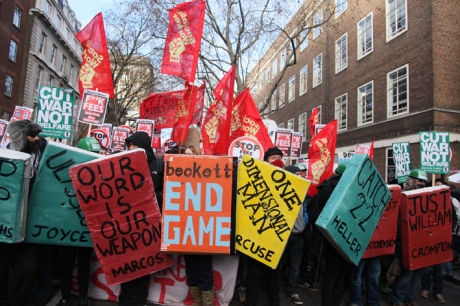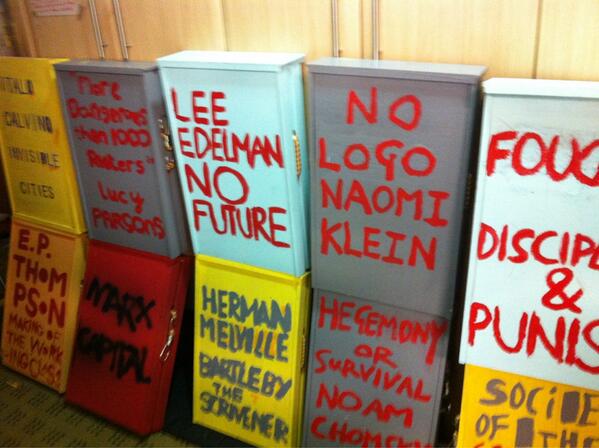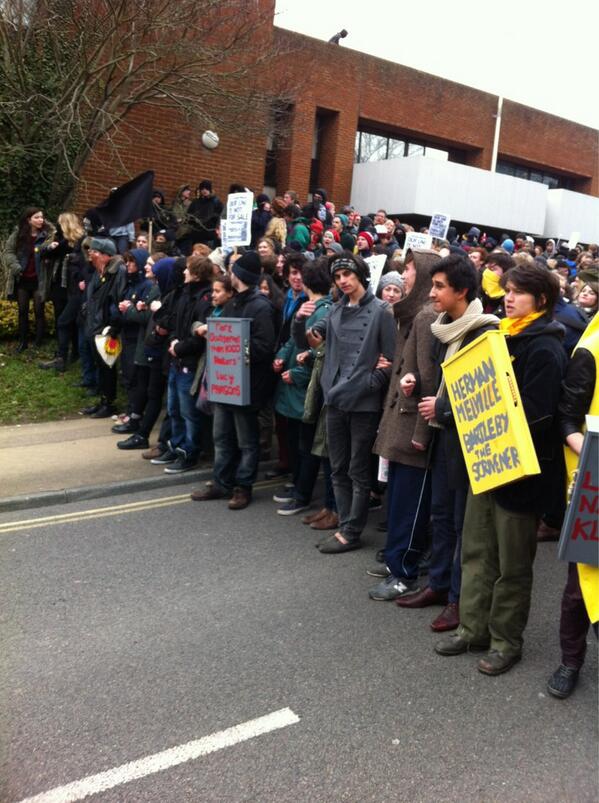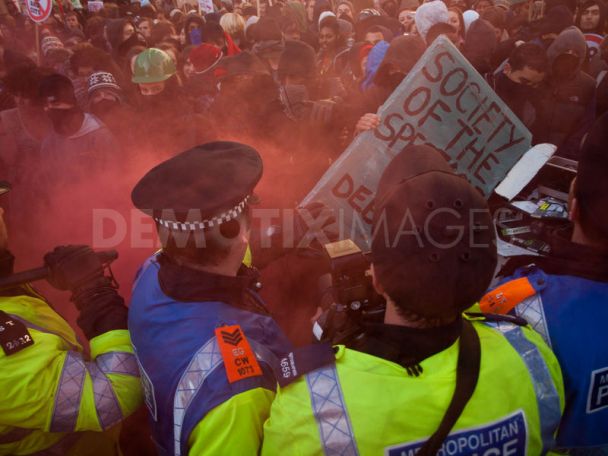A potted history of the book bloc - often students demonstrating against cuts to education using shields decorated as giant books.

23rd November, 2010: Book bloc hits the streets of Rome
Italian students begin actions, occupations and blockings using mock books as banners and shields.
24th November: Book bloc gets its name
A few hours after students clashed with the police in Rome carrying padded shields styled as books, Wu Ming reports:
Our novel Q clashes with the Italian police. Students and teachers on the war path. Riots and demonstrations all over the country. High schools and universities occupied by the students. Violent clashes with the police in front of the Senate. Berlusconi’s education reform is encountering blatant opposition, and the fact that the government is in crisis makes the movement raise its multifarious head even more. This afternoon, in Rome, students confronted the cops while carrying shields with book titles on them. The meaning was: it is culture itself that’s resisting the cuts; books themselves are fighting the police. It was in this incendiary midst that our novel Q showed up, and in good company to boot: Moby Dick, Don Quixote, Plato’s The Republic, A Thousand Plateaux… These pictures appeared on the websites of the most important daily papers. It goes without saying that, whatever will happen, we’re proud of what our novel is doing in the streets. Omnia sunt communia!
A comment on this entry is the first record of the 'book bloc' on the internet.
28th November: A new narrative for the battle
Interviewed by the daily paper Il Fatto Quotidiano, Wu Ming invites us to look closely at the classics the students chose to put on their shields:
Let’s look at the frontline.
Boccaccio’s Decameron, which is about people sharing stories while waiting for the plague to end.
Asimov’s The Naked Sun, which is the description of a world where humans no longer touch each other.
Melville’s Moby Dick, which is an epic tale of obsession.
Cervantes’ Don Quixote, ie the story of a proud, noble man led astray by an obsolete ideology (the chivalrous one).
Petronius’ Satyricon, that is, the description of a greedy, decadent power.
Henry Miller’s Tropic of Cancer, that is, a piece of «auto-fiction», a scandalous mix of autobiography and fiction.
Lenin’s What Is To Be Done?, which deals with the problem of organization.
Deleuze & Guattari’s A Thousand Plateaux, that is, the theme of nomadism, the nomadic war machine.
Shall we summarize? [...]
Our world is infected by the plague (Decameron). The plague is the atomization of social relationships (The Naked Sun). Those who refuse this state of things are often prey to an obsession that cripples their initiatives (Moby Dick), that is to say: the obsession with “Him,” Silvio the Malignant Whale, this 'berluscocentrism' affecting the public discourse. This obsession becomes an ideological barrier and causes us to attack windmills that are put in front of us as baits (Don Quixote). The risk is to be mesmerized by the scene of an outraged, sex-addicted, ever-carousing power (Satyricon). We will avoid such risk only if we find a new story, a narrative of ourselves that will break into this world as a real scandal (Tropic of Cancer), as opposed to all the fake scandals we see in the media. The emergence of a new, unified, conflict-bearing subjectivity would be the only truly intolerable scandal. 'For it must needs be that scandals come', says the old maxim [Matthew, 18,7]. Hence the problem of organization (What Is To Be Done?) And, perhaps, the need to re-read Lenin, rejecting what is to be rejected, revamping what can be revamped.
Of course, today the process of organization can no longer aim at building the party of the proletariat as in the 20th century: organization must take into account the enemy’s superior mobility, it must make us able to fight in an ever-changing situation, a scenario of constant deterritorialization (A Thousand Plateaux). However, without a narrative, without stories to be told in the night around the campfire, any guerrilla warfare in the desert is doomed to failure. And so we return to the first book, the Decameron: it is thanks to the stories we tell one another that we can prevent the spreading of the plague [...]
Well, Q is the only book in the “book bloc” whose authors are still living. Should they have chosen only dead writers? We might say that Q represents the “here and now” of the struggle, the need to act now.
30th November: The clashes in via del Corso, Rome
Students cause chaos around Italy in cuts protest
7th December: Book bloc comes to London
Inspired by, and in solidarity with the Italians and their demo against Berlusconi’s education reforms an assemblage of life-size books are being constructed for this Thursday’s national demonstration against the cuts. With Arts and Humanities a particular target for UK cuts this is a literal display of literary resistance.
Students, artists and cultural workers preparing actions against the cuts. They arranged a meeting point and called for suggestions for the 9th December demonstration.
8th December: The Democratic Library
Uniriot.org - Network of Rebel Faculties - put out a survey to decide collectively which books will feature in the book bloc on 14th December. The results were:
The Will to Knowledge- History of Sexuality, vol. 1 - Michel Foucault
1984 - George Orwell
The Nonexistant Knight - Italo Calvino
The Origin of Species - Charles Darwin
Noi Saremo Tutto - Valerio Evangelisti
Ethics - Benedict de Spinoza
Fahrenheit 451 - Ray Bradbury
Fight Club - Chuck Palanhiuk
Doctor Zhivago - Leonidovich Pasternak
Without a Glimmer of Remorse - Pino Cacucci
The Divine Comedy - Dante Alighieri
Q - Luther Blisset
What a Body Can Do - Gilles Deleuze
Cyborg Manifesto - Donna Haraway
Total Chaos - Jean Claude Izzo
The Odyssey - Homer
The Tempest - William Shakespeare
The Shock Doctrine - Naomi Klein
Comedians, Frightened Warriors - Stefano Benni
The Possessed - Fyodor Dostoevsky
9th December: Italian press takes credit on behalf of the nation
The book bloc - foam books/shields invented at La Sapienza University of Rome - now marches on London too.
Antonio Castaldo, Corrier della Sera
9th December: Book bloc London press release

The book bloc joins the student and public sector workers’ protest to affirm and defend what is under attack: Our universities and public libraries, literacy, thought, culture and jobs. In the past few weeks our attempts to do so peacefully have been met by police with batons, riot shields and horses. These are not isolated incidents of brutality but part of a system of institutional violence. By bringing books into the streets we are drawing attention to the violence at the heart of the neo-liberal ideology of the Con-Dem government.
When the police kettle us, baton us or charge us we will not only see police violence against individuals but the state’s violence against free thought, expression and education.
Books are our tools – we teach with them, we learn with them, we play with them, we create with them, we make love with them and, sometimes, we must fight with them.
A declaration of intentions by Arts Against Cuts.
9th December: Book block stands firm in British Parliament Riot
The book block did well during today's demo at Parliament and beyond (as did all the other brilliant fighters in the masses). Here Guy Debord's great text 'The Society of The Spectacle' resists police attacks. Caught up in between NUS, Education Activist Network, Green Party, SWP, NCFAC and all those others who really just seek to take power, those who just got on with resisting the police attacks gladden the heart.
9th December: The book bloc recognizes itself
Within the book block a new generation recognized and found itself in the protest. Today in lots of cities the Italian student movement is showing something more than just solidarity: this is because your struggle is our struggle and all around Europe students are against the increasing of fees, the privatisation of the university and the education cuts. You are not alone in UK: an European event, a new generation do not want to stop. We have the force whom want to change the world and we have the intelligence to do it. It is just the beginning!
Uniriot: “European Calling: is just the beginning! Call in It/Eng/Fr/De”.
10th December: Corporate media read the books
Radical writing is often described as being at the intellectual barricades, but here at the protest, metaphor became reality. The books were not only at the barricades, they were the barricades, behind which the students could both take shelter and push forward; could “transgress” across the police lines while the truncheons fell on the books, not the demonstrators. The scene embodied something profound: ideas do shield people, and those who dislike the status quo can find protection in words of subversion.
Jay Griffiths, Guardian
12th December: Book bloc shows up in Genoa

12th December: Wu Ming examines the titles
In the public representation of the movement, never had books been given such an importance. One book, of course, has already been in the squares: the 'Little Red Book' by Mao Zedong . But it was one book, and always the same, waved around as a sacred text. Today, however, the metaphor of 'books as weapons' has become concrete, in a way that is unprecedented, through a multiplicity of references, dense with meanings. Seeing a cop hammer away at a classic... well... it's priceless!
14th December: Book bloc reaches the age of majority in their home town
[youtube]z2Lzey9Gf2o[/youtube]
While Silvio Berlusconi is confirmed as Life Emperor of Italy, books are seen all around the riots and clashes being heavily repressed by police and clumsily depicted by corporate media.
14th December: Also in Milan

Reported by @Wu_Ming_Foundt: Also reaches Berlusconi’s home town, although some of the guys prefer blank paper.
22nd December: 'No violence, but a lot of anger' in Palermo
[youtube]3HI-LJjqGA0[/youtube]
As students go on fighting the cuts on the streets, books clash the pigs again (see photographs here and here).
23rd December: Cover feature in Spain
Diagonal, Spain's most-read underground periodical, reports: “La dictadura de los mercados sacude Europa”, illustrated with books from Rome.
24th December: Art attack book for your bloc
[youtube]0pAea8o__b8[/youtube]
UniRiotTV aims for D.I.Y.
23rd February, 2011: More talking
A seminar called "From Tute Bianche to the book bloc: the Italian movement and the coming European insurrection” is held at the lecture theatre of the Courtauld Institute, London.
What thread links the political experience of Tute Bianche with the book blocs we have seen last autumn on the streets of Rome and London? What is the link between the alter-globalisation movement of Seattle and Genoa and the student and youth movements that are now setting Europe on fire?
An English transcript of the seminar.
15th May: Book block occupies Umeå's streets
Hundreds of Umeå (Sweden) residents marched in protest against politicians' wanting to move the library away from the city center. Leading the demonstration at the front was the book block, specifically Machiavelli's The Prince, between JK Rowling's Harry Potter and the Philosopher's Stone and Sappho Poems.

18th June: Book block arrives in Oakland, USA

2nd October: In Manchester, UK
22nd October: And soon after in Berkeley, USA

17th November: In Madrid, Spain

14th November, 2012: Book bloc travels to Milan, Turin and its birthplace Rome.
Books show solidarity with their students during the European-wide General Strike.
[youtube]FlCiM2D_eF0[/youtube]
[youtube]XA6vzzH8RGw[/youtube]
[youtube]fPd9aZ0hjsA[/youtube]
21st November: In London, UK
The book bloc makes a welcome return to the UK at the NUS national demonstration, specifically the feeder march at Montague Place.

25th March, 2013: National demonstration against privatisation and the outsourcing of 235 jobs at Sussex University, UK
The books come to play and resist the police with students, campus workers and BIG COMMUNISM! (See here).



A specialised version of the book bloc; books constructed from sofa cushions. Absorbs blows & pretty sturdy!
4th December: Students occupy University of London Senate House in opposition to the way their university is being run and the way the higher education sector as a whole is controlled (see here).

Q travels across Europe to form a blockade with its friends.

Mostly from this tumblr account and wordpress account with minor changes.






Comments
Simply amazing. Never heard
Simply amazing. Never heard of this before!
One point of transition
One point of transition between Rome and the UK: a text distributed in London at occupied art schools from about 1st Dec, and online from 6th Dec, points to the Rome book bloc as an inspiring example, paraphrasing Wu Ming's essay:
"During recent demonstrations in Rome, students brought out shields to defend against police batons, with book covers painted onto them. Culture itself appeared to be resisting the cuts. During the 2007 Climate Camp protests in London, shields appeared with huge haunting photographic portraits of the faces of climate refugees upon them. The TV cameras caught the police striking these faces with their batons to contain the crowd. Such re-engineering can be directly functional as well as symbolically powerful."
http://artsagainstcuts.wordpress.com/2010/12/06/a-users-guide-to-demanding-the-impossible/
Okay now... They look good
Okay now... They look good and I can see how the image is media friendly and is symbolic.
But to me they kinda look gimmicky....
And at the end of the day, does it really matter what's painted on
Your shield as long as you and it hold the line?
I don't wanna be that guys but... Y'know...